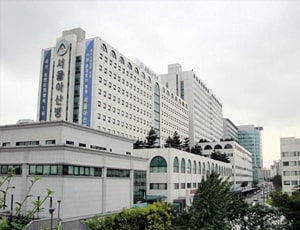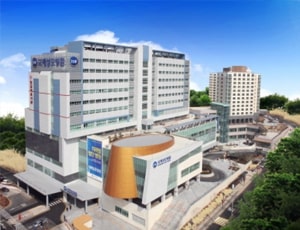Treatment cost

Asan Medical Centre located in Seoul, South Korea is accredited by ISO. Also listed below are some of the most prominent infrastructural details:


International St. Mary's Hospital located in Seoul, South Korea is accredited by JCI. Also listed below are some of the most prominent infrastructural details:
Uterine cancer as the name suggests is cancer that is present or begins in the endometrium (cells that form uterus lining). It is a rare form of cancer that usually lasts for a medium-term duration. Stage IV is the most advanced cancer stage and the most extensive. Even though a medical diagnosis is needed to confirm this cancer, they are to be supported with lab tests and imaging tests. Pelvic exam, pap test, ultrasound, and biopsy, sometimes CT or MRI may also be performed.
The main uterine cancer treatment is surgery which removes the uterus. The treatment is ultimately dependent on the stage you are in, chemotherapy or radiation could be required in advanced cases.
There are various signs and symptoms of uterine cancer such as
Abnormal vaginal bleeding
Vaginal discharge
Pain with urination and/or sex
Pelvic pains
The gynecologic oncologist may suggest any of these available treatment choices such as surgery, radiation, chemotherapy, and hormone therapy. The direction that the treatment can take is decided upon factors such as the stage of uterine cancer you are in, your age, and health parameters.
Surgery: Removing ovaries, uterus, part of the vagina, fallopian tubes, and nearby lymph nodes
Chemotherapy: Cycles of drug being administered with gaps in between. These drugs are given to the patient via an IV.
Radiation Therapy: Internal or external radiation
Hormone Therapy: The usage of progesterone on the uterine cancer cells.
Risks and Complications of Uterine Cancer Treatment
There are various treatment methods and related side effects of each treatment procedure. We mention here the risks and complications due to chemotherapy and surgery.
Side effects due to Chemotherapy:
Fatigue
Risk of infection
Nausea and vomiting
Hair loss
Loss of appetite, and diarrhoea
Inability to become pregnant
Early menopause
Side effects due to Surgery:
Pain and tiredness
Nausea and vomiting
Difficulty emptying the bladder and having bowel movements
Menopausal symptoms (incase ovaries are removed)
Swelling in legs (in case lymphadenectomy is done)
Inability to become pregnant (when hysterectomy is done)
The frequency of the post-treatment consultations should be higher during the first one to two years post-treatment.
During these consultations, it is important to update the doctor about any additional symptoms if any which might indicate the return of cancer or another condition.
Regular physical examinations including pelvic examination and medical tests include blood tests and X-rays should be undertaken during post-treatment consultations.
A recommended post-cancer treatment rehabilitation plan must include
Physical Therapy
Pain Management
Nutritional Planning
Emotional Counselling
Ask your healthcare adviser for the best multiple options and choose the one that meets your expectations
The cost of Uterine Cancer Treatment in Seoul may differ from one medical facility to the other. The Uterine Cancer Treatment package cost usually includes all the expenses related to pre and post surgery expenses of the patient. Typically, the package cost of Uterine Cancer Treatment in Seoul includes the expenses related to the surgeon's fee, anesthesia, hospital, meals, nursing and ICU stay. There are many things that may increase the cost of Uterine Cancer Treatment in Seoul, including prolonged hospital stay and complications after the procedure.
There are many hospitals across the country that offer Uterine Cancer Treatment to international patients. The following are some of the most renowned hospitals for Uterine Cancer Treatment in Seoul:
Upon discharge from the hospital after Uterine Cancer Treatment in Seoul, the patients are advised to stay for about 14 days for recovery. This is important to ensure that the surgery was successful. During this time, control and follow-up tests take place to check for medical fitness.
Apart from the cost of Uterine Cancer Treatment, the patient is also required to pay additionally for daily meals and guest house accommodation. The per day extra expenses in Seoul per person are about 40 USD.
After Uterine Cancer Treatment surgery, the patient is supposed to stay for about 7 Days in the hospital for recovery and monitoring. This time frame is important for the patient to recover properly and feel comfortable after the surgery. With the help of several tests, it is determined that the patient is doing fine after the surgery and is okay to be discharged.
There are more than 2 Hospitals that offer Uterine Cancer Treatment in Seoul. These hospitals have the required expertise as well as infrastructure available to handly patients who need Uterine Cancer Treatment. These hospitals comply with all the rules and regulations as dictated by the regulatory bodies and medical association in Seoul
Some of the most sought after doctors for Uterine Cancer Treatment in Seoul are: